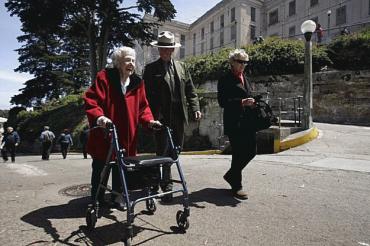
Betty Lou Vickery, 93, who lived on Alcatraz when it was a military prison, walks on a road near the cell block with Ranger John Cantwell and Rita Adams, her granddaughter-in-law, during Vickery's visit to the island.
Betty Lou Vickery is one of the rarest people anywhere. She lived on Alcatraz Island when it was a military disciplinary barracks – before it became the most famous penitentiary in America.
“There can’t be many people in the world still around who lived here then,” she said on a return visit this week to Alcatraz, now part of a national park and crowded on June afternoons with tourists who come to look at the grim island and hear stories about the bad old days.
But to Vickery, who is 93, a walk around Alcatraz was a visit home. “It was nice to come back,” she said. “It makes me feel comfortable.”
Though Alcatraz was a military prison during the five years she lived there from 1929 to 1934, she lived an idyllic life, which she remembers fondly.
She grew from a girl into a young woman on Alcatraz, leaving when she was 17. Her father, Master Sgt. Lewis Thornton, was the sergeant of the guard, and Betty Lou and her family had a four-bedroom house on the island’s south side, facing the glittering lights of San Francisco.
To school by boat
Vickery went to school in the city by boat every weekday, and when she was at Galileo High School, she organized a party on Alcatraz for her school pals. It was a balmy evening, there was a dance, and the prison orchestra played. She remembers that an inmate named Williams played the piano. He was in for killing his wife but was a very nice man, she remembered. Alcatraz was an island of two worlds when Sgt. Thornton and his family – a wife and five children – lived there. About 100 to 170 military prisoners and 30 to 40 guards, all soldiers, lived there. There were also a dozen or so wives and children – Army brats, they are called in the military.
Alcatraz was a minimum-security lockup in its later Army days, not the fearsome dead-end penitentiary for the worst federal prisoners in the country. That changed in 1934, when people like Al Capone and Machine Gun Kelly replaced the military prisoners and Alcatraz became the Rock.
In its time as a military prison, the Army believed that some prisoners could be rehabilitated and returned to duty. They were locked up only at night. Most had jobs on the island and had the run of the place. The guards didn’t carry guns, only billy clubs filled with lead, and the families mixed with the prisoners, even at the evening movies.
“They weren’t prisoners to us,” Vickery said. “They were people.”
Yet there was an immense gulf between people who were free and those who weren’t. When any of the girls on the island went through the cell block on an occasional errand, a whistle would blow and all the inmates had to face the walls.
“But there was never any incident, not one in the five years I was there,” Vickery said.
Her father “never discussed prison business at home,” Vickery said. “When he was home, he was home.”
Company you kept
There is a family saying that Sandy Barron, Vickery’s daughter, remembers hearing all the time: It was a wonderful life, except for the company you kept.
Vickery recalls some unpleasant things about life on Alcatraz – the endless wind, for one thing. The year that it was foggy for 275 days. The incessant noise that came from the Golden Gate Bridge, then under construction.
“It was bang, bang, bang, all the time, 24 hours a day,” she said.
Vickery’s father was a career soldier who served in the peacetime Army, and in World War II and Korea. He retired as master sergeant after 33 years and died in 1956. He is buried at the Presidio of San Francisco.
Vickery’s daughter and her granddaughter-in-law, Rita Adams, accompanied Vickery on her visit Tuesday. For hours, they sat near the main cellblock talking about the old days. “This really is her home,” said Adams.
‘Rock star on the Rock’
Visitors noticed the old lady and heard a little of her story. They asked her to pose for pictures. “Look,” said Park Service Ranger John Cantwell, “Betty Lou is a rock star on the Rock.”
Then it was time to take the ferry back to San Francisco for the drive home to Roseville, near Sacramento.
Vickery plans to return Aug. 8 for the annual Alcatraz reunion for former federal convicts and former guards. It’ll be her first one. She hopes the Stewart brothers, Ray and Robert, the only other survivors of the Army days on Alcatraz, will return as well.
“I taught those boys how to dance,” Vickery said.
